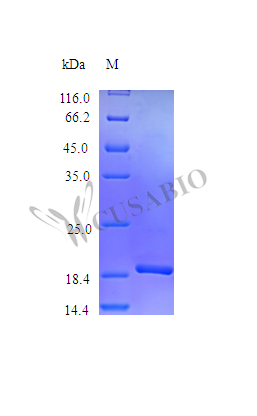Our product CSB-AP003361MO is an active recombinant mouse IL11. It is generated by expressing the vector that contains the gene fragment encoding the 22-199aa of the mouse IL11 in E.coli. Its biological activity is validated by a cell proliferation assay using murine T11 cells, with an ED50 of < 2 ng/ml, corresponding to a specific activity of >5.0x105 IU/mg. Its purity is up to 97% as assessed by SDS-PAGE. The endotoxin level of this recombinant IL11 is less than 1.0 EU/μg as determined by the LAL method.
Mouse IL11 is a cytokine belonging to the IL6 family, which is important in various biological processes, including inflammation, tissue repair, and immune responses. It is primarily produced by activated fibroblasts and epithelial cells in response to inflammatory stimuli. IL11 exerts its effects through the IL11 receptor, which is widely expressed in various tissues, including the heart, lungs, liver, and kidneys [1][2].
IL11 is involved in hematopoiesis and immune responses. IL11 has been shown to enhance the efficacy of hematopoietic stem cell transplantation in models of aplastic anemia by modulating signaling pathways that promote cell proliferation and survival [3]. Moreover, IL11 has been identified as a key player in autoimmune conditions, such as experimental autoimmune encephalomyelitis, where it regulates inflammatory processes and demyelination [4]. In reproductive biology, IL11 is essential for female fertility, particularly during the implantation phase. It has been demonstrated that IL11 signaling is critical for decidualization in the mouse endometrium, and disruptions in this signaling pathway can lead to infertility [5][6].
References:
[1] A. Widjaja, S. Shekeran, E. Adami, J. Goh, J. Tan, V. Sivakumar, et al., A neutralizing il-11 antibody improves renal function and increases lifespan in a mouse model of alport syndrome, Journal of the American Society of Nephrology, vol. 33, no. 4, p. 718-730, 2022. https://doi.org/10.1681/asn.2021040577
[2] C. Denis, K. Kwack, S. Saffaripour, M. Srinivas, P. André, R. Schaub, et al., Interleukin 11 significantly increases plasma von willebrand factor and factor viii in wild type and von willebrand disease mouse models, Blood, vol. 97, no. 2, p. 465-472, 2001. https://doi.org/10.1182/blood.v97.2.465
[3] Y. Wang, Z. Niu, Y. Guo, L. Wang, F. Lin, & J. Zhang, Il-11 promotes the treatment efficacy of hematopoietic stem cell transplant therapy in aplastic anemia model mice through a nf-κb/microrna-204/thrombopoietin regulatory axis, Experimental & Molecular Medicine, vol. 49, no. 12, p. e410-e410, 2017. https://doi.org/10.1038/emm.2017.217
[4] B. Gurfein, Y. Zhang, C. López, A. Argaw, A. Zameer, T. Moran, et al., Il-11 regulates autoimmune demyelination, The Journal of Immunology, vol. 183, no. 7, p. 4229-4240, 2009. https://doi.org/10.4049/jimmunol.0900622
[5] E. Dimitriadis, L. Robb, L. Yx, A. Enders, H. Martin, C. Stoikos, et al., Untitled, Reproductive Biology and Endocrinology, vol. 1, no. 1, p. 34, 2003. https://doi.org/10.1186/1477-7827-1-34
[6] N. Karpovich, P. Klemmt, J. Hwang, J. McVeigh, J. Heath, D. Barlow, et al., The production of interleukin-11 and decidualization are compromised in endometrial stromal cells derived from patients with infertility, The Journal of Clinical Endocrinology & Metabolism, vol. 90, no. 3, p. 1607-1612, 2005. https://doi.org/10.1210/jc.2004-0868






